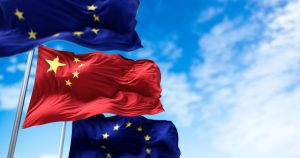China’s Foreign Ministry condemned a resolution passed by the European Parliament concerning Hong Kong’s shrinking rights to free speech, even as Beijing seeks to restore economic links with the EU.
The EU body overwhelmingly adopted a resolution Thursday citing the deterioration of the city’s freedoms since the imposition by Beijing of a sweeping national security law in 2020. It urged the Hong Kong government to release and drop all charges against activist publisher Jimmy Lai, who was arrested under the security law, along with other pro-democracy activists. It also renewed its call on the EU to introduce targeted sanctions against officials responsible for “the ongoing human rights crackdown in the city,” including Hong Kong leader John Lee.
The Chinese Foreign Ministry’s office in Hong Kong issued a statement late Thursday alleging the parliament was trying to use Hong Kong to contain China’s growth, saying such a strategy was “doomed to failure.” The statement said the EU Parliament was interfering with China’s internal affairs and trampling on the principles of international law.
“The political drama of a small number of foreign politicians cannot shake the government’s firm determination to administer Hong Kong according to law and hold crimes accountable,” the statement read.
Hong Kong, a former British colony that returned to China’s rule in 1997, was promised the right to retain its Western-style freedoms for 50 years after the handover. But after the 2019 pro-democracy protests that spiraled into violence, Beijing has steadily tightened its grip on the semi-autonomous region.
Since then, large numbers of democracy supporters and a portion of the educated middle class have left the city, and the United States has imposed sanctions against past and present Hong Kong leaders over the harsh crackdown on rights in the international financial hub.
Beijing and its local allies, who now control local government entirely, see the movement as a Western plot to contain China and have ruthlessly prosecuted opponents.
Another major source of contention is China’s alleged “secret overseas police stations,” which have been reported across North America, Europe, and in other countries where Chinese communities include critics of the Communist Party who have family or business contacts in China. China denies that they are police stations, saying that they exist mainly to provide citizen services such as renewing driver’s licenses.
In its statement Thursday, the parliament said it “condemns the attempts made by Chinese authorities to target their diaspora communities in the EU.”
“Finally, Parliament calls on the Chinese authorities to repeal the National Security Law and to stop impeding the work of journalists,” the statement said. The resolution was adopted by 483 votes in favor, nine against and 42 abstentions.
China’s response dismissed the politicians’ works as “nothing more than a botched political performance.”
In separate statement Friday, the foreign affairs office also lashed out at a U.S. State Department report on human trafficking in Hong Kong, saying it was “full of political bias” and used human rights as a tool to stigmatize others.
The U.S. report said the Hong Kong government did not fully meet the minimum standards for the elimination of trafficking, although it was making significant efforts to do so.
China has also been rankled by EU politicians making visits to Taiwan and hosting politicians from the self-governing island that Beijing considers its own territory and threatens to invade.
The escalation of the diplomatic row between China and the EU comes days before Chinese Premier Li Qiang’s planned visit to Germany and France next week, marking his debut on the international stage as China’s second-ranking leader.

































